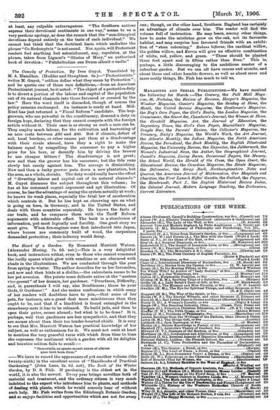The Comedy of Protection. By Ives Guyot. Translated by M.
A. Hamilton. (Hodder and Stoughton. 6s.)—" Protectionists," writes M. Guyot, "seldom define what they mean by Protection"; and he quotes one of these rare definitions,—from an American Protectionist journal, be it noted: "The object of a protective duty is to divert a portion of the labour and capital of the population out of its natural channels into those favoured or created by the law." Here the word itself is discarded, though of course the policy remains unchanged. An instance is ready at hand. Mid- /lent has just returned a "Fiscal Reform" candidate. The hop- growers, who are powerful in the constituency, demand a duty on foreign hops, declaring that they cannot compete with the foreign article without it. Their case is as strong as such a case can be. They employ much labour, for the cultivation and harvesting of an acre costs between ..f.,30 and ZIO. But if climate, defeat of soil, local burdens, or other causes put them at a disadvantage with their rivals abroad, have they a right to make the balance equal by compelling the consumer to pay a higher price for his beer, or damnify him by driving the brewer to use cheaper bitters ? The disadvantage is not groat; now and then the grower has his successes ; but the tide runs slowly but surely against him. The acreage is diminishing. Now and then a lucky grower puts down a new plantation, but the area, as a whole, shrinks. The duty would really have the effect of "diverting labour and capital out of its natural channels." M. Guyot discusses the subject throughout this volume ; he has at his command cogent argument and apt illustration. Of course, he has the advantage of seeing the system actually at work; he knows its weak places, especially the fatal law of acceleration which controls it. But he has kept an observing eye on what is going on here, in Germany, and in the United States, and deals with these countries separately. He knows the facts of our trade, and he compares them with the Tariff Reform arguments with admirable effect. The book is a storehouse of information, put most logically and forcibly. One good story we must give. When fire-engines were first introduced into Japan, where houses are commonly built of wood, the carpenters demanded protection ; their industry would decay.










































 Previous page
Previous page